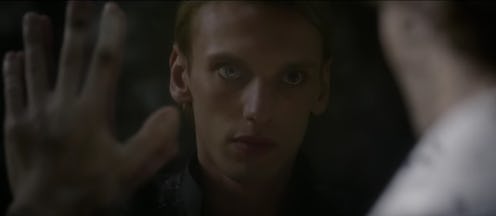Entertainment
The New ‘Fantastic Beasts’ Is A *Huge* Disappointment When It Comes To Dumbledore’s Past
In the new addition to the Potterverse, Fantastic Beasts: The Crimes of Grindelwald, out Nov. 16, fans of J.K. Rowling's wizarding world will finally have a chance to watch the young version of Albus Dumbledore (Jude Law) in action. Of course, since the whole movie revolves around the series' villain, Gellert Grindelwald (Johnny Depp), Grindelwald and Dumbledore's relationship is one of the film's most important ones. Not only do Dumbledore and Grindelwald represent powerful wizards on opposite sides of the good vs. evil scale, but they also have a complicated backstory which the second Fantastic Beasts movie portrays... kind of. Major spoilers ahead.
In The Crimes of Grindelwald, Dumbledore acts as a sagacious mentor for the movie's protagonist, Newt Scamander (Eddie Redmayne). After Dumbledore learns that Grindelwald has escaped from prison and fled to Paris, the future Hogwarts headmaster advises Newt to also go to Paris so that the magizoologist can find Credence (Ezra Miller) before Grindelwald does. As for why Dumbledore can't go to Paris himself, the powerful wizard explains that it's because of Grindelwald. That puzzling revelation later gets explained, when a Ministry of Magic contingency shows up at Hogwarts to reprimand Dumbledore for sending Newt.
When visiting Hogwarts, the Ministry officials tell Dumbledore to go and stop Grindelwald, but Dumbledore refuses to fight him. One of the party conjures up a memory of a young Dumbledore and Grindelwald, facing each other. It looks like they could be leaning in to hug, but then the young boys turn into their adult selves, and they're glaring at each other. When it's said that they were "like brothers," Dumbledore tells the group that they were actually closer than that.
Later in the movie, Dumbledore looks into the Mirror of Erised, which is exciting on its own, but what he sees is even more interesting. The mirror shows Dumbledore and Grindelwald as teens, the two boys cutting their hands, then using a charm to combine their blood and split it in half so each man can carry it in a pendant. Earlier in the movie, when Grindelwald escapes from custody, he seems to use the item.
At the end of the movie, Newt sees Dumbledore's charm with the combined blood and identifies it as a blood pact. "You swore not to fight each other," Newt says. That clarifies an earlier scene from the film in which Grindelwald tells Credence that he's the only one that can kill Dumbledore. It's not that Grindelwald doesn't have the skill or power to do so, but he would likely also die if he were to kill Dumbledore because of the blood pact. As GQ points out, a blood pact is an unfamiliar term in the Potterverse, but it sounds like the Unbreakable Vow, which would kill any wizard who defies it.
In the end, Newt asks Dumbledore if he can possibly fight Grindelwald if he destroys the blood pact's charm, and Dumbledore responds, "Maybe." Clearly, the end to the Fantastic Beasts five-part series will end with the blood pact's reversal, because Pottermore states that Albus Dumbledore defeated Grindelwald in 1945. They don't meet at all in this film.
Not only will the lack of interaction between Dumbledore and Grindelwald disappoint audiences, but also the fact that the film doesn't explicitly portray Grindelwald and Dumbledore as former lovers. Back in 2007, J.K. Rowling had told an audience in New York that Dumbledore is gay, per The Telegraph. Not only that, but Rowling explained that Dumbledore had fallen in love with Grindelwald before the latter became consumed by the dark arts. After Dumbledore's heart had been broken, he later defeated his rival, and Rowling called the whole relationship a "great tragedy."
The movie leaves the relationship up to interpretation, as the visions do seem intimate and even romantic. But the new film is so vague that fans have a right to feel cheated of an important gay love story that would complicate Dumbledore's feelings towards Grindelwald. Sure, the professor seemed to hint at it in his comment about how close they really were, but the LGBTQ+ community deserves a romance between to men that's proudly declared rather than loosely implied.
Perhaps in the next Fantastic Beasts installment, Grindelwald and Dumbledore's romance will finally be revealed more directly. For now, one can only hope.
